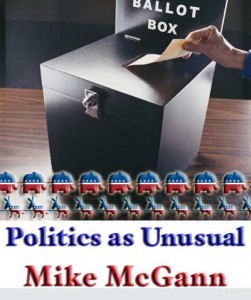And they may have a point, when it comes to sales tax hike
By Mike McGann, Editor, The Times
 WEST CHESTER — Five of the county’s state legislative delegation pushed back on Gov. Tom Wolf’s sales tax increase proposal Friday — arguing that it would cost Chester County taxpayers an additional $177 million a year in taxes.
WEST CHESTER — Five of the county’s state legislative delegation pushed back on Gov. Tom Wolf’s sales tax increase proposal Friday — arguing that it would cost Chester County taxpayers an additional $177 million a year in taxes.
State Representatives Dan Truitt (R-156), Becky Corbin (R-155), Tim Hennessey (R-26), Duane Milne (R-167) and Warren Kampf (R-157) said they would be willing to work with the new governor on crafting what they call “a realistic budget plan,” but say his proposed increase in sales tax rate along with an expansion of what would be taxable would create too much of a tax burden on local residents and hurt economic growth, during a media event in the county’s historic Courtroom One.
Wolf’s proposal would increase the sales tax from 6% to 6.6% and apply sales taxes to a wide range of new products and services, including newspapers (and advertising), day care and babysitting (and even diapers), a range of senior and elder care, including in-home nursing care, college textbooks, college room and board and college meal plans.
Combined with a proposed income tax increases, a new flat rate of 3.7%, Republicans argue that the Wolf plan would raise some $8 billion in additional revenue during the 2016-17 fiscal year, with just $3 billion intended to for property tax relief, and another $600 million for school funding. That, they say, leaves some $4.5 billion in other additional spending — what they termed a massive increase in state spending.
While a Wolf spokesperson argued in published reports that much of the Wolf plan is similar to elements of an earlier GOP proposal to eliminate property taxes, HR 76 — there are some overlaps, but Wolf’s plan hit seniors and college students more. And, to be honest, HR 76 was kind of a brain-dead proposal in the first place, that would have eliminated almost all local fiscal control over schools.
Wolf’s people also take issue with the GOP math — saying that the $177 million figure is not accurate and that the tax impact on Chester County residents will be lower.
And while I reached out to local Democrats — and the governor’s office — for response, being Saturday morning, I didn’t get one (in fairness — I was booked up Friday afternoon and couldn’t reach out then).
I’ll expect we’ll see a full response next week, and I’ll follow up with those points to make sure both sides of the argument get a fair airing. While one of the downsides of holding a Friday afternoon media event is lack of exposure — weekend news is kind of a black hole and most folks won’t be seeing this until Monday morning — it does make it hard for the other side, unless prepared and organized, to make a cogent response.
But on first blush (and assuming that Republican characterization of the Wolf tax plan is right, a big assumption) — and unless this is Wolf as Truitt put it “throwing things at the wall and seeing what sticks” — this tax plan is flat-out nuts (which makes me wonder what I’m missing). It’s bad policy and bad politics, to a level unseen in Harrisburg in quite a while, which is really saying something.
Consider the problem with any Democratic proposal that puts local Republicans in the unusual position of making this argument: boosting the sales tax is arguably the most regressive tax option and one that falls disproportionately on the poorest residents of the state.
And yes, I’m biased (this is a column, after all, not a straight news story). As a small business owner, it’s a killer — I’m exactly the kind of small business, a sole proprietor LLC which will be seeing a sizable tax hike if this plan is enacted. It will slow my company’s growth and limit the number of people I can hire.
Add into the provisions to tax advertisements and legal services and it’s a hit to my bottom line and unfairly burdens me while leaving my competition, owned by a large corporation untouched. I can probably live with either a sales tax boost (and/or expansion to a limited number of new products, largely in the “sin tax” arena) — although I think they slow the economy and hurt the state’s poorest and youngest people — or a moderate bump in the income tax, but not both.
As lousy as it would be for me and my small business, worse is the impact on those with young children, in need of daycare and those at end of life in need of specialized nursing care. If you’re a Democratic governor and Republicans are able to call you out on being heartless to the weakest and poorest in our society, you are on the wrong side of the argument here.
So the big question is this: is this a bargaining position, or will Wolf dig his heels in?
The five Chester County Republican legislators Friday said they were ready to engage in real negotiations, a real give and take on the budget, but expressed worries that the budget fight will run past the June 30 deadline and potentially drag on for months. After a number of years of arguing against any tax increases, a number of them acknowledged Friday “a structural deficit” in the state’s finances and allowed some additional revenue is needed.
Very few local Republicans oppose taxing the gas from the Marcellus Shale — the argument now is solely down to the rate, with the two sides not that far apart. And it seems likely that any number of southeast Republicans would support some smaller increase in sales or income tax, to help close the deficit.
But….they want something back: liquor privatization and something, maybe even anything, when it comes to public pension reform. The spikes in pension contributions are strangling local school districts and making the state’s financial situation worse by the year, while getting the state out of the liquor business is overwhelming popular around the state.
Politically speaking, they need something back. No GOP legislator can vote for any tax increases without getting something major back — a number of them would face a primary (and may anyway) if they vote for any increase in sales or income tax. Without being able to make the counter argument of having made progress on public pensions and getting liquor privatization done, Wolf’s budget would be asking them to commit political suicide. And they won’t.
Hopefully, Wolf is just staking out a bargaining position — albeit one that might make him even less popular than his predecessor, Tom Corbett. Hopefully. If this is really the governor’s policy intention and plan — what he really wants to do — the state has managed to elect a governor woefully uniformed when it comes to policy impact and the realities of politics.
* * *
Is it too early to start the sinking ship jokes about the U.S. Senate candidacy of Joe Sestak, the former congressman who represented parts of Chester County before running for U.S. Senate and losing to Pat Toomey in 2010?
That national and state Democratic leaders have reached out to Josh Shapiro — currently the chair of the Montgomery County Board of Commissioners and a former state representative — to run is a pretty interesting and complicated development.
Sestak made a lot of enemies when he ran against the late Arlen Specter in the 2010 Democratic primary — after so much effort was made to get the long-time U.S. Senator to switch parties, from President Barack Obama on down. Beating Specter and then losing to Toomey was kind of salt in the wounds to state party leaders and as well as the Senate Democratic Campaign Committee, then chaired by Sen. Chuck Schumer — who now stands to become Majority Leader of the Senate if the Democrats can somehow regain the majority. Without winning back Toomey’s seat, that could be a tall order.
In short, Sestak angered a lot of folks, both nationally and locally (the latter because he and his staff weren’t always really good at working with local parties and came off as brusque at times).
But the former admiral does have one very strong support group: Team Clinton. With Hillary Clinton expected to announce her run for the presidency Sunday and the profound likelihood she will be the Democratic nominee, it gives Sestak a bit of muscle to push back, not to mention a big boost in fund raising.
With Clinton at the top of the ticket, Sestak might have a fighting chance to beat Toomey in 2016 — a year that may turn out pretty poorly for Republicans nationally. The question remains: how much muscle will the Clintons use to help him win the U.S. Senate nomination at the risk of losing what will likely be a hard-fought battle for Clinton to win Pennsylvania?
Shapiro is a young riser — and a bright guy. He’d be a formidable candidate against Toomey with a lot less baggage than Sestak, but he lacks state-wide name identification and it is unclear whether he’d be able to raise the kind of money Sestak can.
It’s something to watch — if Clinton doesn’t endorse Sestak and do so strongly, it’s a signal that the race is open and she’s going to largely stay out of it. If she does, you have to wonder whether it could cause a new rift in the Democratic Party and potentially both ease Toomey’s reelection efforts and push Pennsylvania toward the GOP in the 2016 presidential race.
At minimum, it bears watching.






